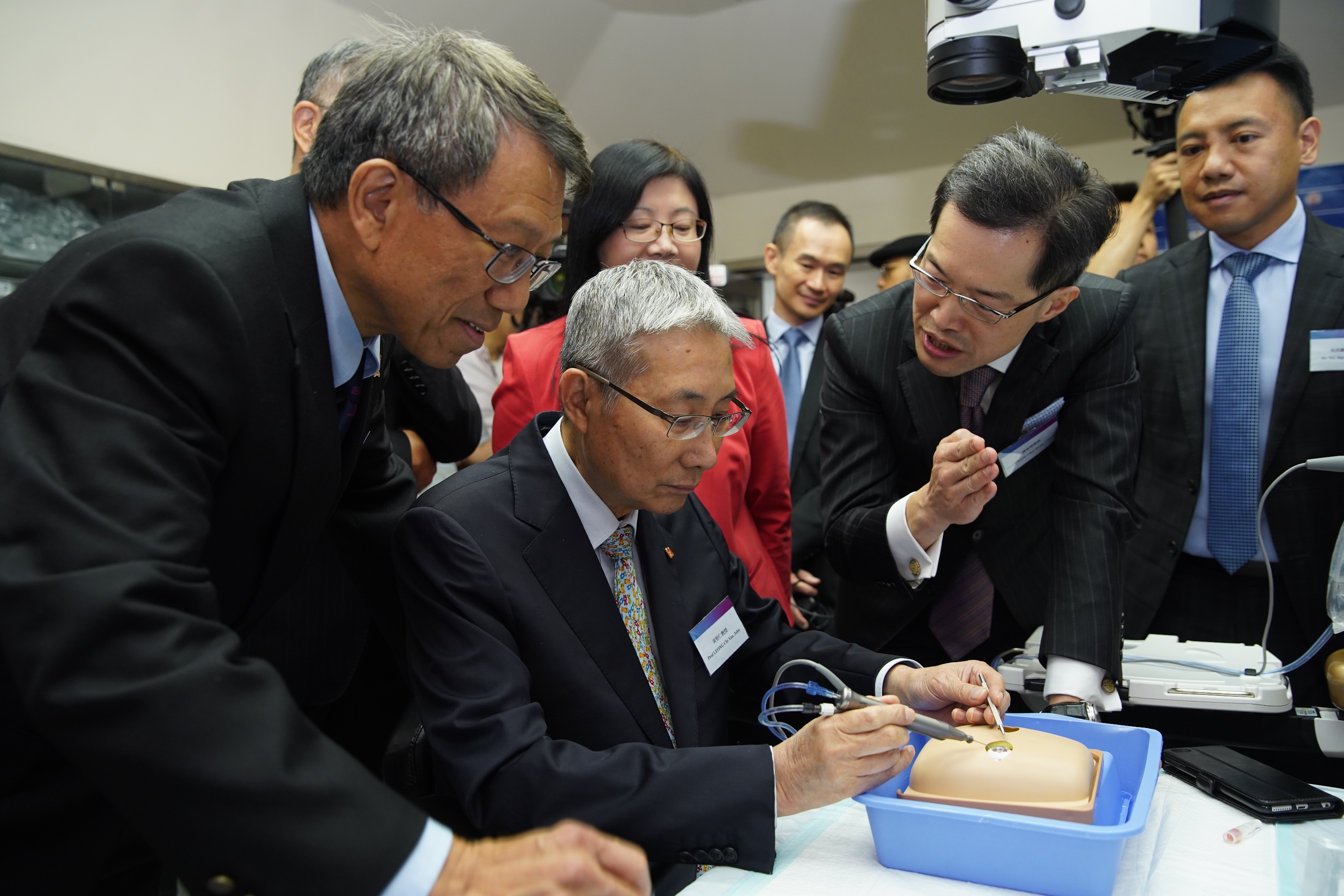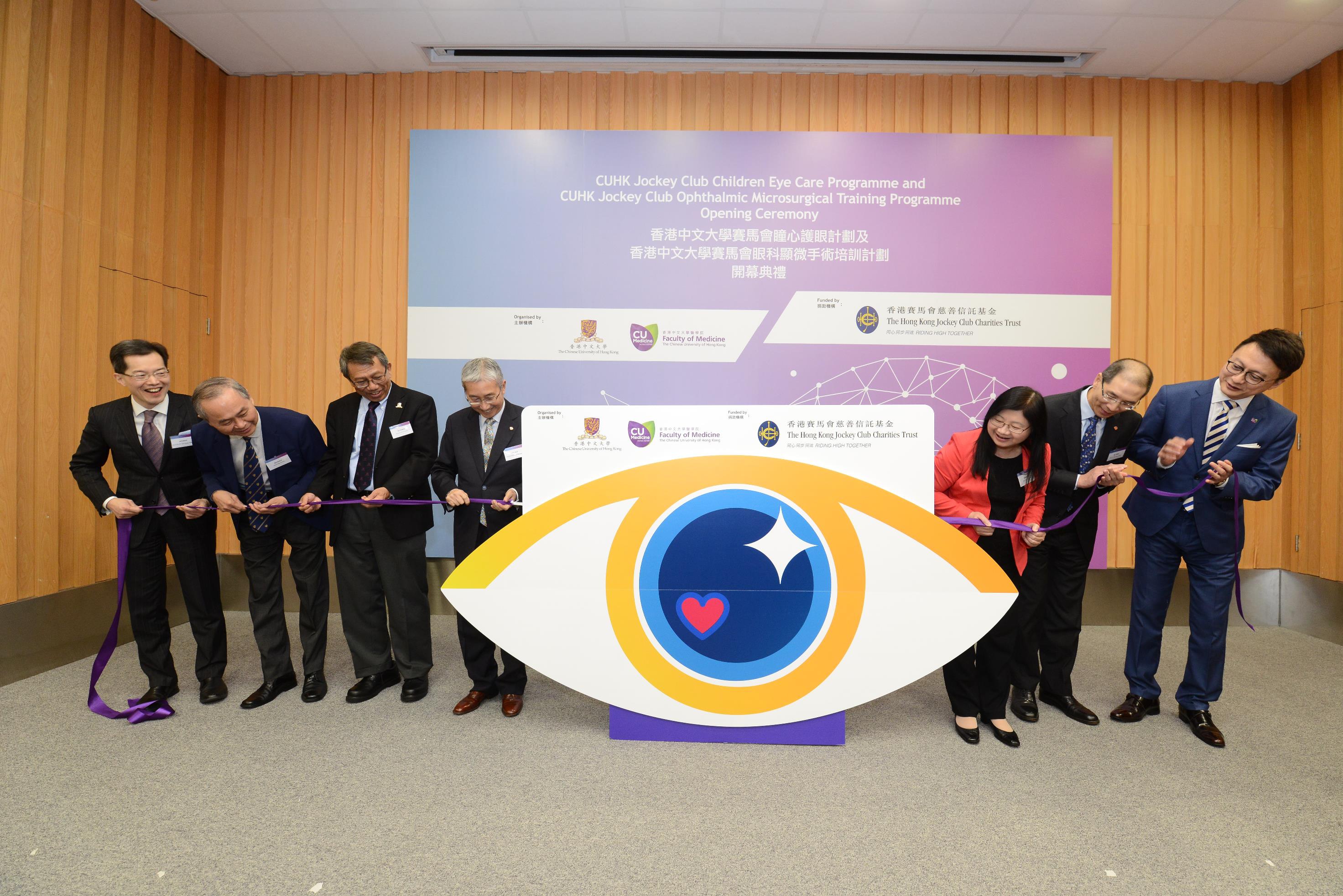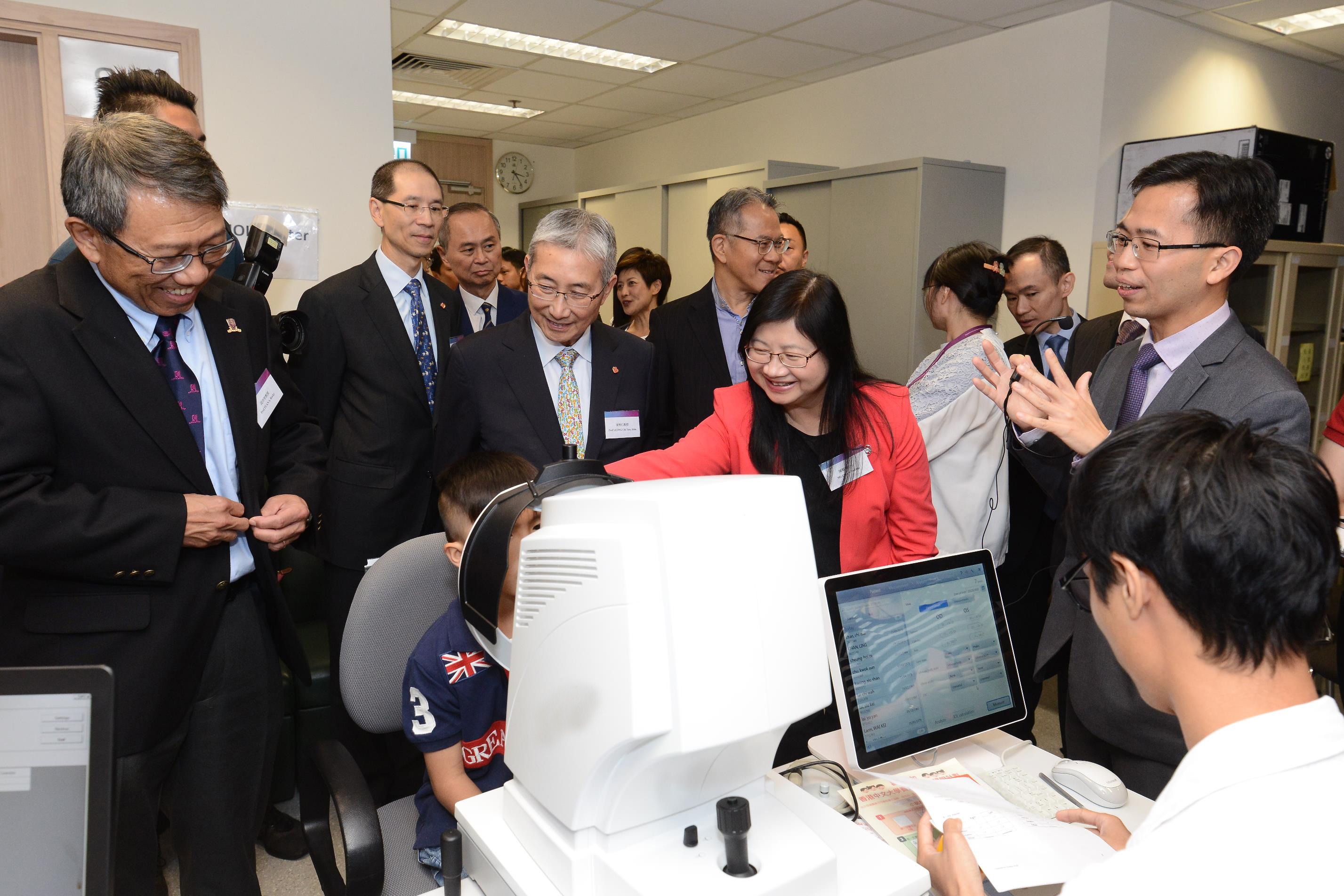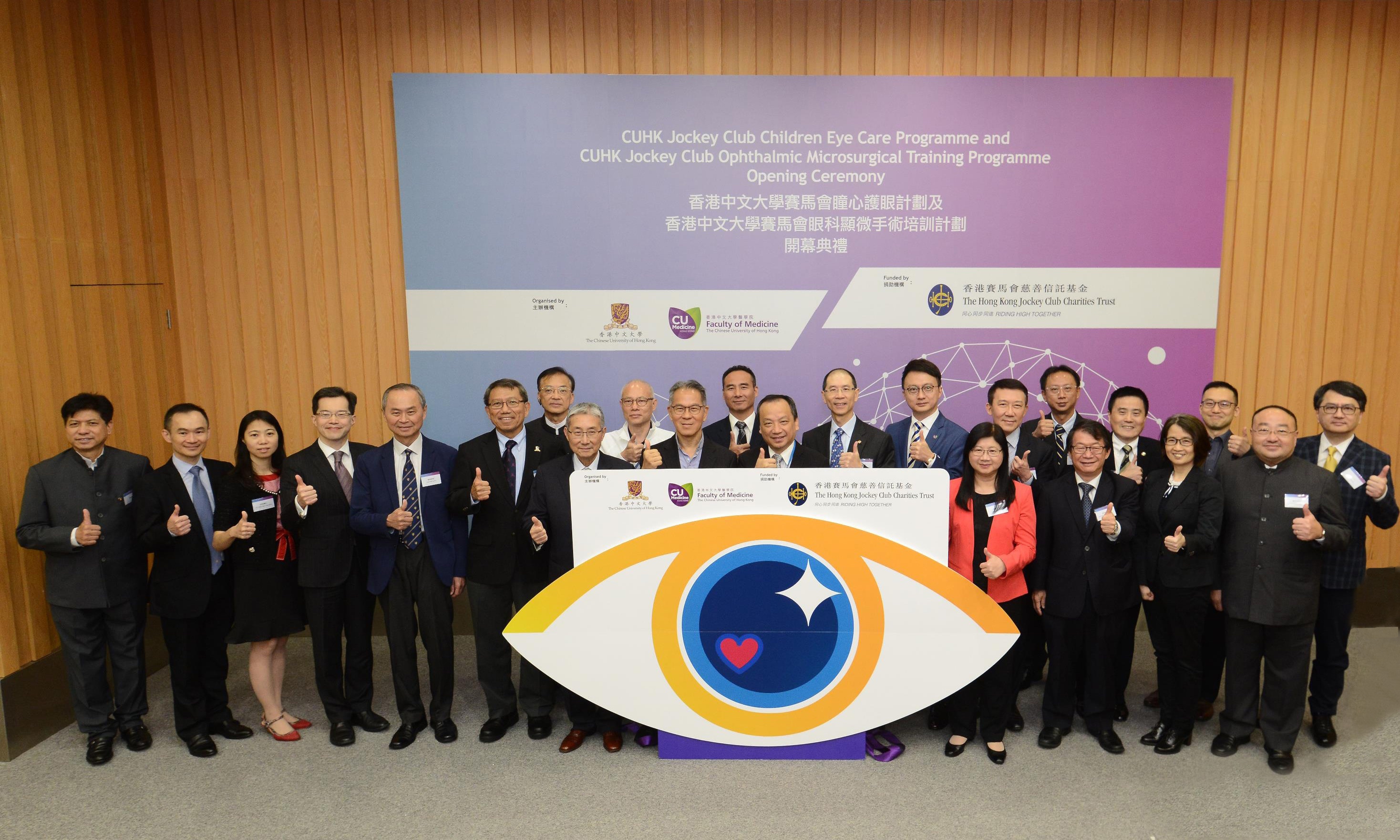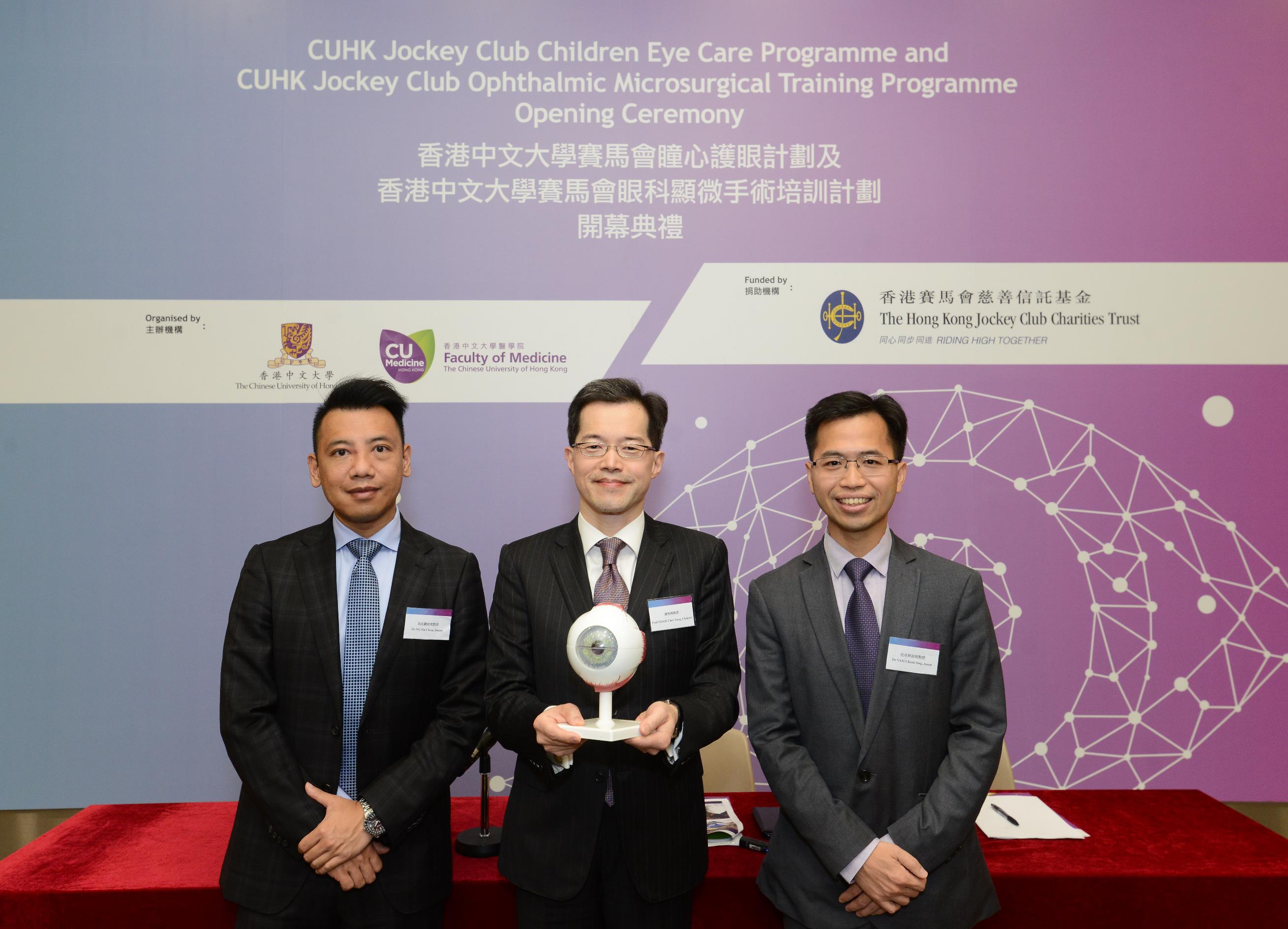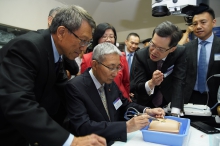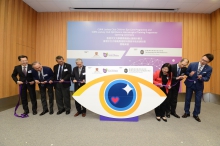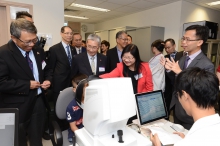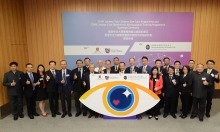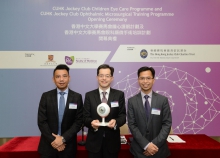CUHK
News Centre
CUHK Receives Nearly HK$78 Million from HKJC to Launch Ophthalmic Programmes for Children’s Eye Care and Ophthalmic Microsurgical Training
The Department of Ophthalmology and Visual Sciences of the Faculty of Medicine at The Chinese University of Hong Kong (CUHK) has received a generous donation of nearly HK$78 million from the Hong Kong Jockey Club (HKJC) Charities Trust for the establishment of two ophthalmology programmes, namely “CUHK Jockey Club Children’s Eye Care Programme (CUHK Jockey Club CECP)” and “CUHK Jockey Club Ophthalmic Microsurgical Training Programme (CUHK Jockey Club OMTP)”, to promote eye health in Hong Kong.
An opening ceremony for the two programmes was held today (14 July) at the Hong Kong Eye Hospital. The ceremony was officiated at by Professor John LEONG Chi-yan, Chairman of the Hospital Authority, Ms. Imelda CHAN, Head of Charities (Grant Making – Elderly, Rehabilitation, Medical, Environment & Family), HKJC, Professor Rocky S. TUAN, Vice-Chancellor and President of CUHK, Professor Francis Ka Leung CHAN, Dean of the Faculty of Medicine at CUHK, and Professor Clement Chee Yung THAM, Chairman, Department of Ophthalmology and Visual Sciences, Faculty of Medicine at CUHK.
Forty percent of children aged 6-8 years in Hong Kong have eye problems
Short-sightedness, also known as myopia, is becoming a serious problem amongst children in Hong Kong. As these children grow up, they will have a progressive and irreversible increase in the degree of short-sightedness. Severe short-sightedness not only impairs their vision and their ability to learn, but also increases the risk of other eye diseases in future, such as glaucoma and retinal detachment.
Professor John LEONG Chi-yan remarked at the ceremony, “Eyes are the windows to the soul and should be well protected. A comprehensive eye examination at an early age could ensure that our children will have a healthy development in their vision and allow early intervention. This would also lead to better visual outcomes and reduce the burden to our public healthcare service in the long run.”
Ms. Imelda CHAN said the Club had long been committed to development of the city’s medical and health services. It had worked closely with CUHK on a number of projects, in addition to supporting these two programmes providing eye examinations for children and advanced training for medical professionals. For example, the Club had also supported the setting-up of the CUHK Medical Centre and recently launched the CUHK Jockey Club Multi-Cancer Prevention Programme to deepen public understanding of obesity-related cancers and raise their awareness of cancer prevention.
Professor Rocky S. TUAN remarked, “With the tremendous support from all parties, I believe that the two new programmes will greatly contribute to the medical service in Hong Kong by providing excellent healthcare to the public and by reinforcing Hong Kong’s leading role in ophthalmic training within the Asia Pacific region.”
The CUHK ophthalmology team conducted a pilot vision screening programme for Hong Kong children, the Children’s Eye Screening Programme, from 2015 to 2017, providing free and comprehensive eye examination for 4,257 children aged between 6 to 8 years. The pilot programme revealed that 13% of children aged 6 have short-sightedness and the percentage markedly rose to 41% among children aged 8. In addition, 3.4% were incidentally found to suffer from lazy eye (amblyopia) and 7.3% from squint (strabismus).
Dr. Jason Cheuk Sing YAM, Director of CUHK Jockey Club CECP and Assistant Professor from the Department of Ophthalmology and Visual Sciences, Faculty of Medicine at CUHK, explained, “The CUHK Jockey Club Children’s Eye Care Programme is an extension of the Children’s Eye Screening Programme, with which we aim to provide free comprehensive eye examination to 30,000 children at age 6-8 in Hong Kong, through collaborations with schools and community partners. Our goals are to detect eye diseases in children before the age of 8, which is the period when their visual system completes its development, and to provide appropriate treatment to reduce the chance of permanent visual impairment. During the three years of screening, we have identified 12 children with congenital corneal diseases or retinal diseases, which are not detected by routine eye tests.”
Professor Clement Chee Yung THAM added, “The new three-year CUHK Jockey Club CECP will generate substantial clinical data to facilitate our genetic research, and help us understand the influence of genetic and environmental factors in eye diseases. Our preliminary data from the pilot programme demonstrated that if both parents are severely short-sighted, the risk of their child developing the condition is up to 12 folds when compared to children whose parents are not short-sighted.”
With the gracious support of a HK$44 million donation from the HKJC Charities Trust, CUHK Jockey Club CECP was launched in January 2018 and by now has completed the examination of over 5,000 children. Tests performed for the children include visual acuity check, cycloplegic refraction, and detailed examination on eyeball structure including eyeball length, retina, optic nerves, retinal vessels, as well as corneal topography and macular scan. Furthermore, the team organises regular educational seminars and outreach programmes, to raise awareness and increase knowledge about the eye health of children within the community.
Rising demand for ophthalmic microsurgical training
As the population ages, the number of elderly patients suffering from major eye diseases, such as cataract, glaucoma and retinal diseases is constantly on the rise. Hence, more effective eye surgery training, free from risks to patients, is very much needed to train up a new generation of eye doctors in the latest ophthalmic microsurgery.
Professor THAM, also Director of CUHK Jockey Club OMTP, emphasised, “Ophthalmic surgeries require highly specialised skills. Nowadays, almost all eye surgeries are performed under an operating microscope, which require very fine and specialised skills. And such microscopic surgery is often performed under local anesthesia, when the patient is fully awake. Considering the rising demand, we have developed the first ophthalmic microsurgical training platform in Hong Kong to provide comprehensive, structured and well-supervised surgical training to our local medical professionals. Young eye doctors can now learn and practise new surgical procedures and skills, while being completely risk-free to patients. The simulated training platform also allows surgical learning in a much less stressful environment for our young doctors.”
With the tremendous support from the HKJC Charities Trust of more than HK$33 million, the CUHK Jockey Club OMTP commenced operations this January. The training suite provides simulated eye surgery training with animal eyes, artificial eyes, as well as computer-simulated operative environments. More than 100 eye doctors and eye care professionals will be able to enhance their surgical and procedural skills through this programme every year.
Professor Francis Ka Leung CHAN remarked, “Over the years, CUHK Medicine has been committed to promoting medical professional training and research. CUHK Jockey Club OMTP not only provides an ideal platform for effective and quality professional training, but also promotes the development of ophthalmic microsurgical technology. We also value connections with the community, and CUHK Jockey Club CECP collaborates with organisations from different parts of the territory. Our medical students serve as children’s eye care ambassadors to assist with various types of eye examinations, and to help with public education on eye protection. We look forward to learn the research data and technology from the two programmes which would enhance medical care and promote public eye health.”
Guests visit the ophthalmic microsurgical training equipment at the CUHK Eye Centre. Every year more than 100 eye doctors and eye care professionals will be able to enhance their surgical and procedural skills through the “CUHK Jockey Club Ophthalmic Microsurgical Training Programme”.
The Faculty of Medicine at The Chinese University of Hong Kong (CUHK) receives a generous donation from the Hong Kong Jockey Club (HKJC) for the establishment of two ophthalmology programmes, “CUHK Jockey Club Children’s Eye Care Programme” and “CUHK Jockey Club Ophthalmic Microsurgical Training Programme”. Officiating guests of the opening ceremony include (from left) Professor Clement Chee Yung THAM, Chairman, Department of Ophthalmology and Visual Sciences, Faculty of Medicine at CUHK; Professor FOK Tai-fai, Pro-Vice-Chancellor of CUHK; Professor Rocky S. TUAN, Vice-Chancellor and President of CUHK; Professor John LEONG Chi-yan, Chairman of the Hospital Authority; Ms. Imelda CHAN, Head of Charities (Grant Making - Elderly, Rehabilitation, Medical, Environment & Family), HKJC; Dr. Albert LO, Cluster Chief Executive, Kowloon Central Cluster, Hospital Authority; and Professor Francis CHAN, Dean of the Faculty of Medicine at CUHK.
“CUHK Jockey Club Children’s Eye Care Programme” aims to provide free comprehensive eye examination to 30,000 children at age 6-8 in Hong Kong. The goal is to detect eye diseases in children before the age of 8, which is the period when their visual system completes its development, and to provide appropriate treatment to reduce the chance of permanent visual impairment.
Collaborators of the “CUHK Jockey Club Ophthalmic Microsurgical Training Programme” and “CUHK Jockey Club Children’s Eye Care Programme”.
The CUHK Medicine ophthalmology team’s "Children’s Eye Screening Programme" reveals that for those children whose both parents are severely short-sighted, their risk of developing the same condition will be up to 12 folds when compared to children whose parents are not short-sighted. (From left) Assistant Professor Dr. Danny Siu Chun NG , Department Chairman Professor Clement Chee Yung THAM and Assistant Professor Dr. Jason Cheuk Sing YAM.


